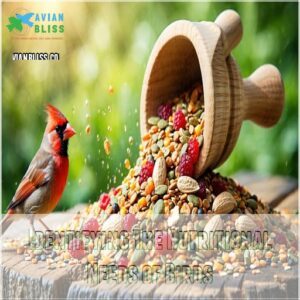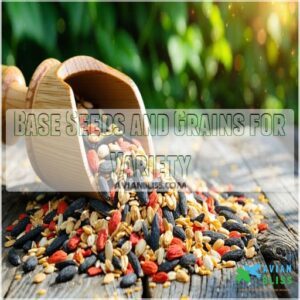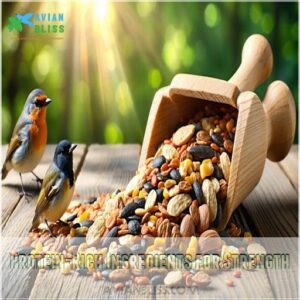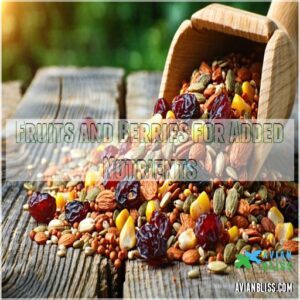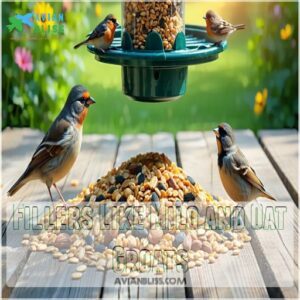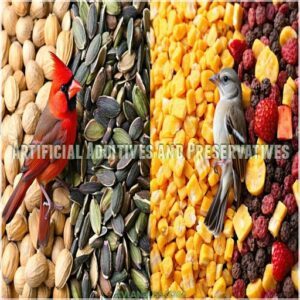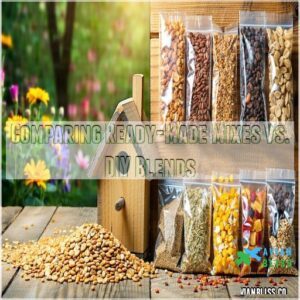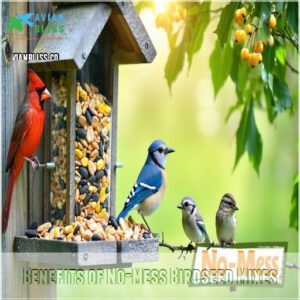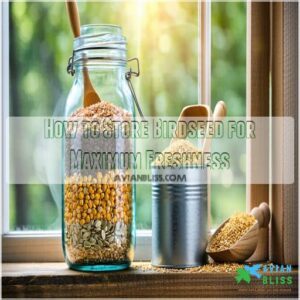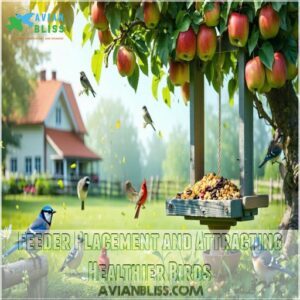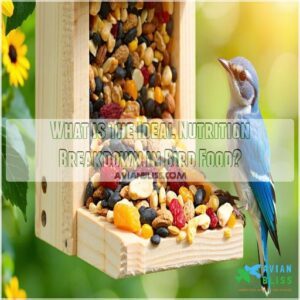This site is supported by our readers. We may earn a commission, at no cost to you, if you purchase through links.
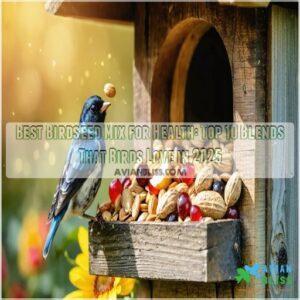
Look for blends packed with black-oil sunflower seeds, Nyjer seeds, and safflower seeds—all favorites loaded with energy-rich fats and proteins.
Add peanuts for muscle support and a treat of fruit bits for an energy boost.
No-mess mixes with hulled seeds save cleanup time while keeping birds happy.
Avoid fillers like wheat or milo (birds aren’t fans) and skip artificial additives—they’re like junk food for our feathered friends.
Store seeds in a cool, dry spot for freshness, and watch your yard become the ultimate bird buffet—they’ll thank you with song!
Table Of Contents
- Key Takeaways
- 10 Best Birdseed Mixes for Health
- 1. Wagner’s Greatest Variety Wild Bird Food
- 2. Wagner Black Oil Sunflower Bird Food
- 3. No Waste Patio Bird Food
- 4. Lyric Wild Bird No Waste Mix
- 5. Wagner Nyjer Seed Wild Bird Food
- 6. High Energy Suet Cakes 10 Pack
- 7. wild bird food mealworms supplement
- 8. Wagners gourmet wild bird food
- 9. Premium Shelled Peanuts for Pets
- 10. No Squirrel Bird Seed Mix
- Identifying The Nutritional Needs of Birds
- Key Components of a Healthy Birdseed Mix
- Ingredients to Avoid in Birdseed Mixes
- Comparing Ready-Made Mixes Vs. DIY Blends
- Benefits of No-Mess Birdseed Mixes
- How to Store Birdseed for Maximum Freshness
- Feeder Placement and Attracting Healthier Birds
- What is The Ideal Nutrition Breakdown in Bird Food?
- Frequently Asked Questions (FAQs)
- What is the healthiest bird seed?
- What is the healthiest thing to feed birds?
- Is seed mix healthy for birds?
- What is the best combination of bird feeders?
- How to prevent mold in bird feeders?
- What seeds attract rare bird species?
- Are organic birdseed mixes worth the cost?
- Can birds eat seeds mixed with suet?
- Which seeds are safest for baby birds?
- Conclusion
Key Takeaways
- Pick birdseed mixes with black-oil sunflower seeds, Nyjer seeds, and safflower seeds for energy-rich fats, proteins, and essential nutrients.
- Avoid fillers like wheat, milo, and artificial additives—they offer no value and are often wasted.
- Use no-mess mixes with hulled seeds to keep feeding areas clean and reduce waste.
- Store birdseed in a cool, dry spot to maintain freshness and attract healthy, active birds.
10 Best Birdseed Mixes for Health
You’ll find the perfect mix for your backyard birds with these top-rated blends that combine premium ingredients like black oil sunflower seeds, nyjer, and safflower.
Whether you’re looking to attract cardinals, finches, or chickadees, these carefully selected mixes offer the right balance of protein, fats, and carbohydrates to keep your feathered friends healthy and coming back for more, with the right mix of premium ingredients and nutrients like nyjer.
1. Wagner’s Greatest Variety Wild Bird Food
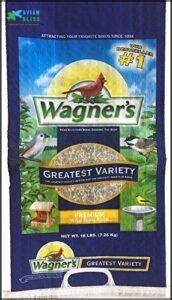
If you’re looking for a feast that’ll attract the whole bird neighborhood, Wagner’s Greatest Variety lives up to its name.
This gourmet blend packs 11 premium ingredients, with 40% sunflower seeds leading the mix. You’ll spot cardinals, chickadees, and woodpeckers flocking to your feeder, thanks to its perfect balance of black oil sunflower, safflower, and nyjer seeds.
For ideal bird engagement, avoid overfilling feeders and ration seed appropriately, as suggested in a helpful birdseed guide. It’s made in the USA and works in any feeder type.
While it’s pricier than basic mixes, the quality and variety make it worth every penny.
Best For: Bird enthusiasts who want to attract a diverse range of birds to their backyard with a premium, convenient seed mix.
- Attracts a wide variety of bird species with its diverse blend of 11 ingredients.
- High-quality ingredients, including 40% sunflower seeds, cater to different bird preferences.
- Convenient and versatile, suitable for various feeder types and made in the USA.
- More expensive than basic birdseed mixes.
- Some reports of occasional quality control issues like mold or moisture.
- Birds may consume the seed quickly, requiring frequent refills.
2. Wagner Black Oil Sunflower Bird Food
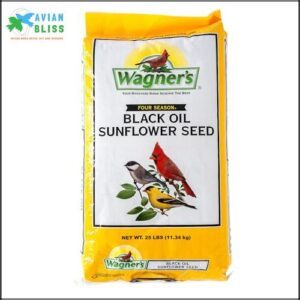
Looking for a versatile bird food that attracts a wide variety of feathered friends?
Wagner’s Black Oil Sunflower Seeds are a hit with cardinals, chickadees, finches, and woodpeckers alike. These thin-shelled seeds are perfect for small-beaked birds, and they’re packed with energy to keep your backyard visitors healthy and active.
Available in 20, 25, and 40-pound bags, they’re ideal for tube feeders or hopper feeders. While you might find the occasional twig in the mix, bird watchers rave about the quality and value, making this an excellent choice for your feathered community.
Best For: Bird enthusiasts looking to attract a variety of birds with a high-quality, easy-to-eat seed.
- Attracts a wide range of bird species, including cardinals, chickadees, finches, and woodpeckers.
- Thin shells make it easy for small-beaked birds to consume.
- High energy content supports bird health and activity.
- Some bags may contain debris like twigs.
- Lacks a resealable closure for maintaining freshness.
- Occasional sprouting of seeds may occur.
3. No Waste Patio Bird Food
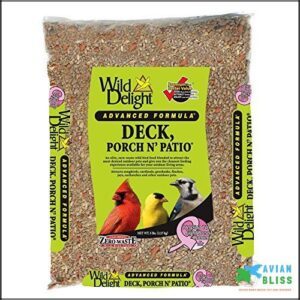
Through your patio door, you’ll spot cardinals and chickadees flocking to Wild Delight’s No Waste Patio Bird Food.
This zero-waste blend packs a nutritious punch with sunflower kernels, pistachios, and peanuts, all pre-hulled for cleaner feeding.
You’ll love how this 5lb bag, starting at $12.58 at Walmart, keeps your deck spotless while attracting bluejays, woodpeckers, and finches.
The added vitamins and minerals support year-round bird health, while the no-mess formula means you’ll spend less time sweeping and more time bird watching.
Best For: Bird lovers wanting a no-mess, nutritious feed to attract a variety of birds to their patios or gardens.
- Clean feeding with no hulls or shells to tidy up.
- Attracts diverse species like cardinals, chickadees, blue jays, and woodpeckers.
- Packed with essential nutrients, vitamins, and minerals for bird health.
- Can attract squirrels due to peanuts and other appealing ingredients.
- Price can fluctuate, sometimes exceeding $20 on Amazon.
- Frequent Buyer Club vouchers are only valid for Wild Delight brand, not store brands like Walmart’s 3-D Pet Products.
4. Lyric Wild Bird No Waste Mix
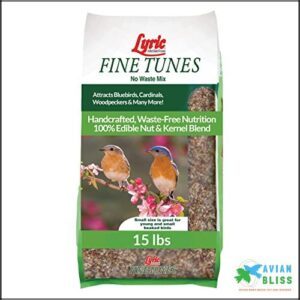
For mess-free bird feeding, Lyric’s Wild Bird No Waste Mix stands out from the flock.
This premium blend features 100% edible ingredients with finely cut nuts and seeds that smaller beaked birds love.
You’ll appreciate how it keeps your patio clean with no discarded shells or hulls to sweep up.
While it might cost a bit more upfront, you’ll save in the long run since birds eat everything you put out.
Just remember to use a covered feeder to protect these tasty morsels from rain and snow.
Best For: Birders seeking a mess-free, high-quality feed that attracts a variety of smaller-beaked birds.
- Minimizes waste and cleanup with 100% edible ingredients.
- Attracts diverse bird species, especially those with smaller beaks.
- Offers excellent long-term value despite a higher initial cost.
- Requires a covered feeder to protect the mix from weather.
- Can be more expensive than traditional birdseed options.
- Some users report birds taking a few days to adjust to the new feed.
5. Wagner Nyjer Seed Wild Bird Food
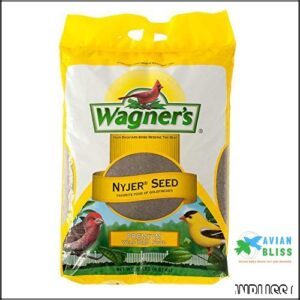
Looking to attract more finches to your backyard?
Wagner’s Nyjer seed might be your golden ticket.
Each pound packs an impressive 150,000 seeds, loaded with protein and healthy fats that’ll keep your tiny visitors buzzing with energy.
The fuzzy fastener press-lock seal helps maintain freshness, while the extra-clean seeds mean less waste under your feeders.
Choosing the right top rated bird seed is important for attracting a variety of bird species to your yard.
Just pop these beauties into a finch tube feeder, and watch as American goldfinches, purple finches, and pine siskins flock to your yard.
It’s pricier than standard mixes, but the quality‘s worth every penny.
Best For: Birders looking to attract finches and other small-beaked birds like goldfinches, purple finches, and pine siskins.
- High energy content and protein-rich for optimal bird nutrition.
- Extra-clean seeds minimize waste and mess under feeders.
- Convenient resealable bag helps maintain seed freshness.
- More expensive than some other birdseed options.
- Some reports of inconsistent quality and finch preferences.
- May require specific finch feeders for best results.
6. High Energy Suet Cakes 10 Pack
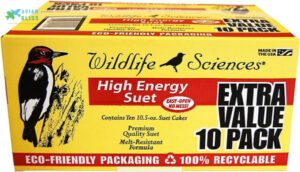
Need a high-energy boost for your feathered friends?
These suet cakes are like a power bar for birds, packed with rendered beef suet, cracked corn, and black oil sunflower seeds.
They’re a favorite of chickadees, cardinals, and even woodpeckers—a great way to lure them away from your hummingbird feeders.
While some birders find them messy, the easy-open, recyclable packaging makes them a breeze to use, with easy-open packaging.
Just be prepared to restock often, as these cakes disappear quickly!
Best For: Bird enthusiasts looking to attract a wide variety of species, especially in colder climates, with a high-energy, easy-to-use suet option.
- Attracts a wide range of popular bird species like woodpeckers, chickadees, and cardinals.
- Melt-resistant formula works in all weather conditions.
- Easy-open, recyclable packaging simplifies storage and feeding.
- Mixed feedback on seed quality, with some users noting an overabundance of corn.
- Birds may consume quickly, requiring frequent replenishment.
- Some users report no attraction from birds in their area.
7. wild bird food mealworms supplement
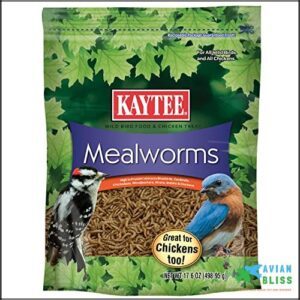
When your usual seed mix isn’t cutting it, dried mealworms are like the secret ingredient that makes birds flock to your yard.
Packed with protein, they’re a big hit with bluebirds, wrens, and woodpeckers, especially during nesting season when energy needs skyrocket.
You can mix them with seeds or serve them solo for a high-energy treat, plus, they’re rehydratable, adding versatility for picky eaters.
Just store them airtight to keep things fresh, birds love them, and your feeder becomes the ultimate hotspot.
Best For: Backyard bird enthusiasts looking to attract insect-eating species like bluebirds, wrens, and woodpeckers with a high-protein supplement.
- Convenient, dried form eliminates the hassle of live mealworms.
- High protein content supports nesting and molting birds.
- Can be used alone or mixed with seed for feeding versatility.
- Requires rehydration for some birds to easily consume.
- Not as nutritionally complete as a standalone diet.
- Some customers feel the bag size is too small for the price.
8. Wagners gourmet wild bird food
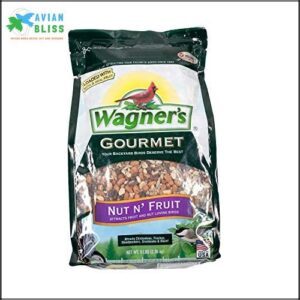
Why do birds flock to Wagner’s Gourmet Wild Bird Food? It’s packed with nutritious sunflower kernels, nuts, and fruit, perfect for fueling their energy year-round.
This filler-free blend means no messy shells or seed growth, making it great for patios or decks. The resealable 5-pound bag keeps the mix fresh, attracting vibrant songbirds like cardinals, chickadees, and woodpeckers.
While it’s pricier than other options, its quality and no-waste formula make it a favorite for birdwatchers who love a clean, active backyard.
Best For: Bird enthusiasts who want to attract a variety of colorful songbirds and enjoy a clean, waste-free backyard experience.
- Nutrient-rich mix with sunflower seeds, nuts, and fruit for year-round bird energy.
- Filler-free blend leaves no shell mess or seed growth, ideal for patios and decks.
- Resealable 5-pound bag keeps the product fresh for longer use.
- Higher cost compared to standard bird feed options.
- Limited availability in small 5-pound bags, requiring frequent repurchases.
- Some users need to remove fruit pieces based on local bird preferences.
9. Premium Shelled Peanuts for Pets
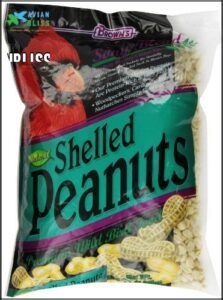
Shelled peanuts are like a bird buffet—100% edible, high in calories, and packed with protein to keep your feathered visitors energized.
They’re a hit with cardinals, woodpeckers, chickadees, and even those cheeky blue jays.
Without the shells, there’s no mess, just clean feeding areas, but beware, squirrels love them too, always go for raw, unsalted peanuts to keep things safe.
Break them into smaller pieces for little birds to enjoy, and watch as your yard becomes a bustling bird hotspot.
Best For: Bird lovers looking to attract a variety of species to their yard while keeping feeding areas clean and waste-free.
- 100% edible with no shells, leaving no mess behind.
- High energy content from healthy oils, fats, and protein.
- Loved by a wide range of birds like woodpeckers, chickadees, and jays.
- Attracts squirrels and other critters, requiring extra deterrent measures.
- Needs careful storage to prevent pests or moths.
- Some users find the bag size and price not ideal for the quantity offered.
10. No Squirrel Bird Seed Mix
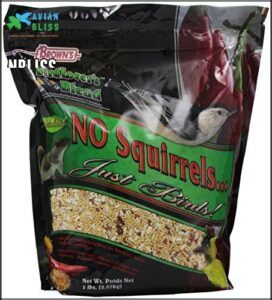
No Squirrel Bird Seed Mix is perfect if you’re tired of squirrels raiding your feeders.
Packed with safflower seeds and infused with hot chili peppers, this mix keeps squirrels at bay while birds enjoy a tasty, squirrel-free snack.
Birds like cardinals, sparrows, and doves love the safflower, while the capsaicin is harmless to them but deters pesky mammals.
It’s natural, preservative-free, and proven to reduce mess around feeders.
Set it out, and you’ll notice happy birds sticking around all day!
Best For: Bird enthusiasts looking to attract a variety of birds while keeping squirrels away from their feeders.
- Effective squirrel deterrent thanks to chili pepper infusion.
- Attracts a wide range of bird species like cardinals and doves.
- All-natural and preservative-free formulation.
- Some users report seed composition can be messy.
- Birds may empty feeders quickly due to popularity.
- May require consistent use to maintain effectiveness.
Identifying The Nutritional Needs of Birds
You can’t pick the best birdseed without knowing what birds actually need to thrive.
Understanding their energy-packed diet of carbs, protein, and healthy fats makes all the difference in keeping them happy and coming back for more.
Energy for Flight and Survival
Birds burn energy faster than you can say "migration season," and their flight patterns demand power-packed foods.
Carbs, fats, and protein keep them fueled for survival. Look for vitamin-enriched birdseed and mixes that boost bird health. A balanced bird diet is essential for their overall well-being.
- Black-oil sunflower seeds: A prime energy source.
- Nyjer seeds: Great for migrators.
- Peanuts: High protein for endurance.
- Fruit pieces: Quick sugar boosts.
- Mineral-enriched blends: Overall nutrition support.
Protein for Growth and Maintenance
Strong feathers and healthy bodies start with protein. It’s the building block for muscle repair, growth, and energy boosts.
A solid birdseed mix for health includes protein sources like peanuts, sunflower seeds, and shelled nuts. For insect-eating birds, mealworms pack an amino acid punch.
Balanced bird nutrition keeps them thriving, so aim for a nutrient balance that fuels their needs and guarantees long-term bird health.
Fat for Sustained Energy Reserves
In the context of sustained flight, birds rely on fat as one of their primary energy sources.
Fat metabolism provides the calorie intake they need for long flights or cold nights.
Including high-energy options like suet cakes or vitamin-enriched birdseed guarantees proper nutrient balance.
A well-rounded birdseed mix for health will offer healthy fats to support bird nutrition without making birds sluggish or overfeeding them.
Balance is everything!
Key Components of a Healthy Birdseed Mix
If you want happy, healthy birds visiting your yard, you’ve got to know what goes into their food.
A good birdseed mix combines quality grains, protein-packed ingredients, and nutrient-rich fruits—think of it as crafting a balanced diet for your feathered guests!
Base Seeds and Grains for Variety
A good birdseed mix starts with a variety of base seeds and grains to please different feathered visitors.
Include these must-haves:
- Sunflower seeds (black oil or hulled) – a favorite for most species.
- Millet – ideal for ground feeders like doves.
- Nyjer seed – a goldfinch magnet!
- Safflower seeds – cardinal-approved.
- Cracked corn – affordable but needs careful storage.
When selecting bird seed types, consider the nutritional value each brings to your mix.
Mix equals smiles for your backyard birds!
Protein-Rich Ingredients for Strength
Boosting your feathered friends’ strength is a snap with protein-rich birdseed ingredients.
Peanut benefits? High energy! Mealworm value? Superior protein! From nutty seeds to suet types, the protein sources abound.
Think peanuts, sunflower seeds, and mealworms for muscle growth and bird nutrition. Choosing the right Protein Rich ingredients is essential for peak health.
Vitamin-enriched birdseed and mineral-enriched birdseed pack an extra punch, ensuring your birds are strong and healthy.
Fruits and Berries for Added Nutrients
After adding protein-packed seeds, sweeten the mix with fruits and berries for energy and added nutrients.
Dried fruit benefits birds by providing vitamins and natural sugars to keep them going, with ingredients like raisins, cranberries, or currants being excellent for attracting berry feeders.
These nutrient-rich additions also cater to birds’ dietary needs, making your birdseed for health stand out. Think of it as dessert—birds love it, and it’s good for them too!
Ingredients to Avoid in Birdseed Mixes
Not all birdseed mixes are created equal, and some ingredients can do more harm than good.
Skip low-quality fillers like milo and oat groats or anything with artificial additives—your feathered friends deserve better!
Fillers Like Milo and Oat Groats
Not all birdseed mixes are created equal, and some are stuffed with fillers like milo and oat groats that birds often avoid.
Milo, in particular, works better as cattle feed than bird food, leaving it scattered untouched beneath feeders. Oat groats might attract a few ground-feeders, but they’re low on nutrition and won’t meet most birds’ dietary needs.
Using seed blends packed with these Low-Quality Seed Fillers can lead to wasted seed and hungry birds.
Instead, focus on filler-free mixes to make certain you’re avoiding nutritional gaps and keeping your backyard favorites happy and healthy. Birds thrive on quality, not cheap shortcuts!
Artificial Additives and Preservatives
Beyond fillers, watch out for artificial additives and preservatives lurking in your birdseed mix. These sneaky ingredients offer no nutritional value and can have harmful additive effects on your feathered friends.
Think of it like junk food for birds! While some preservatives might seem necessary, question their long-term impacts. Opt for natural alternatives whenever possible.
- Check labels for additive identification.
- Harmful additive effects can range from mild digestive upset to more serious health issues.
- Prioritize birdseed quality and choose mixes with natural ingredients.
- Healthy birds thrive on natural, wholesome birdseed ingredients, not artificial enhancements.
Skip the chemical cocktails and keep your birdseed mix as close to nature as possible.
Comparing Ready-Made Mixes Vs. DIY Blends
Deciding between ready-made birdseed mixes and making your own can feel like choosing between a quick meal and a home-cooked feast.
You’ll love the convenience of store-bought blends, but creating your own lets you tailor the mix to match your feathered visitors perfectly.
Advantages of Premium Ready-Made Mixes
Premium mixes offer unmatched convenience for busy bird lovers.
You’ll save time blending seeds while enjoying a vitamin-enriched and mineral-enriched birdseed designed for healthy, happy birds.
These mixes attract a wider variety of species with their balanced formulas and prevent seed spoilage thanks to superior packaging.
Plus, they’re crafted to maximize birdseed quality and minimize waste.
For the best results, consider exploring high-quality seed blends specifically designed for superior bird health and satisfaction.
| Advantages | Description |
|---|---|
| Time-saving | No mixing, ready to pour. |
| Wider bird attraction | Appeals to diverse species. |
| Enhanced nutrition | Boosted with vitamins/minerals. |
Investing in the best birdseed mix secures your feathered visitors’ wellbeing while leaving more time for birdwatching.
Customizing DIY Blends for Specific Birds
Ready-made mixes are handy, but customizing DIY blends gives you control over birdseed recipes personalized for the birds you adore.
Want more finches? Sprinkle in nyjer seeds. Ground feeders like doves or quails? Mix white millet and cracked corn. Experiment with custom suet recipes loaded with peanuts or dried fruit for energy-packed treats. Plus, DIY blends cut out unwanted fillers like milo, giving birds the nutrition they need.
| Bird Type | Best Seeds | Extras | Feeder Style | Notes |
|---|---|---|---|---|
| Finches | Nyjer | Sunflower | Small tube feeder | Attracts goldfinches. |
| Cardinals | Safflower | Suet nuggets | Platform feeder | Keeps squirrels away. |
| Woodpeckers | Peanuts | Suet cakes | Clinging feeder | Adds protein! |
| Ground Feeders | White millet, corn | None needed | Tray feeder | Perfect for doves. |
| Fruit Lovers | Raisins, cranberries | None needed | Platform feeder | Sweet snack! |
Making your own birdseed mix? It’s like a backyard buffet, made your way.
Benefits of No-Mess Birdseed Mixes
No-mess birdseed mixes keep your yard clean and save you the hassle of sweeping up shells and husks.
Plus, birds love the easy-to-eat hulled seeds, which means you’ll attract more feathered visitors without the mess!
Reducing Waste in Feeding Areas
No one wants their yard looking like a birdseed landfill, right? Reducing waste in your feeding area is easy with no-mess bird seed. These blends eliminate pesky shells and husks that normally pile up.
Here’s how you can keep things tidy:
- Opt for shell-free seed options, like hulled sunflower seeds or peanuts.
- Use efficient feeder designs that minimize spillage.
- Store seed properly—airtight containers maintain birdseed freshness longer.
- Avoid mixes with filler foods like milo or wheat. Birds skip them anyway!
- Try eco-friendly feeding solutions, like compact feeders that avoid scattering.
Your yard will stay clean, and the birds will thank you!
Attracting More Birds With Hulled Seeds
Tired of cleaning up seed shells? Hulled seeds, like sunflower kernels, are a game-changer.
They’re perfect if you’re into attracting birds without the mess. Plus, they save time and keep feeding areas cleaner, which helps prevent seed spoilage.
These no-shell options are favorites for cardinals, goldfinches, and chickadees—and a clever squirrel deterrent strategy, too, since less is spilled.
If you’re attracting ground feeders like doves or sparrows, hulled seeds work wonders.
While premium hulled seeds cost more upfront, they’re surprisingly cost-effective since birds eat everything.
For top birdseed freshness, store hulled mixes in airtight containers and skip the fillers.
How to Store Birdseed for Maximum Freshness
You want your birdseed to stay fresh and tasty, not turn into a stale snack no bird wants.
With simple storage tips, you can keep it fresher longer and avoid wasting money or disappointing your feathered friends.
Refrigeration and Freezing Tips
Keeping your birdseed fresh is easier than you think.
Once you’ve tackled waste-free feeding, proper storage keeps your seed in top shape. The trick? Cooler temperatures and airtight storage.
- Store seed in cool, dry places using airtight containers to block moisture.
- For long-term freshness, freeze birdseed in sealed bags. These freezer tips preserve nutrients and prevent pests.
- Regularly check for moldy birdseed—toss any that smells odd or feels damp.
- To reduce the risk of infestations, consider storing bird seed in metal cans, which are durable and pest-resistant.
Storing wisely means less birdseed soaking up moisture and more happy, healthy birds!
Feeder Placement and Attracting Healthier Birds
Where you place your feeders can make or break your birdwatching experience, not to mention the birds’ safety.
Keep them in sheltered spots, out of predators’ reach, and adjust with the seasons to keep your feathered visitors coming back healthy and happy.
Safe Locations to Avoid Predators
Finding predator-safe habitats starts with smart feeder placements.
Position feeders near bushes or trees for quick escapes, but not so close that cats can ambush.
Add a bit of height—elevated feeder setups keep ground predators at bay.
Got a fence?
Perfect—place feeders just inside for added backyard safety zones.
Birds also rely on distraction display techniques like coordinated noise-making to outwit predators, making it essential to maintain a calm environment around feeding zones.
Here’s a quick guide:
| Tip | Benefit | Why It Works |
|---|---|---|
| Elevated feeders | Reduces predator access | Harder to reach from ground |
| Near natural cover | Protects during feeding | Encourages safe environment |
| Inside fences | Limits stalking by cats or predators | Safer bird habitats overall |
These bird feeding tips encourage safe, bird-friendly spaces in your yard!
Seasonal Adjustments for Maximum Visits
Want more feathered friends visiting your feeders throughout the year? Adjust your birdseed mix and feeder placement with the seasons.
- Winter feeding strategies: Offer high-energy suet and birdseed mixes with black oil sunflower seeds to help birds survive the cold. Consider heated bird baths.
- Spring breeding nutrition: Provide calcium-rich foods like crushed eggshells for healthy egg development. A good birdseed mix with protein supports nestlings.
- Summer fledgling diets: Offer mealworms and other protein sources for growing chicks. Keep feeders stocked as fledglings learn to forage.
- Autumn migration mixes: Replenish energy reserves with high-fat birdseed mixes like sunflower and peanuts to fuel their long journeys.
- Seasonal feeder placement: Move feeders to sheltered spots in winter and shady areas in summer. Adjust perches for different bird sizes.
What is The Ideal Nutrition Breakdown in Bird Food?
Want to make sure your feathered friends are getting the best nutrition?
You’ll learn how to create the perfect birdseed blend with the right balance of carbs, proteins, fats, and fiber for happy, healthy birds.
Balancing Carbohydrates, Proteins, and Fats
Birds need a proper macronutrient balance to thrive, just like us.
Their ideal nutritional mix involves carbohydrates, protein, and healthy fats in the right proportions.
Carbs are essential for energy, making up 35-65% of a birdseed mix.
Opt for seeds like white millet or cracked corn as energy sources.
Protein-rich options (12-20%) like peanuts or sunflower seeds support growth and muscle maintenance.
Healthy fat choices (10-15%) such as black oil sunflower seeds give birds energy reserves for long flights.
For more information on high protein bird food, consider incorporating mealworms or egg-based formulas for an extra protein boost.
A well-balanced birdseed mix with proper seed proportions guarantees your feathered visitors stay active, vibrant, and ready to sing another day!
Maintaining Fiber Levels for Digestion
Think of fiber in a bird’s diet like the oil that keeps an engine running smoothly—essential for healthy digestion.
Fiber benefits birds by aiding their digestive system, helping them absorb nutrients, and avoiding nasty issues like blockages.
Fiber-rich bird foods, like hulled sunflower seeds and grains, are great natural fiber options for meeting bird dietary needs.
A good nutritional mix balances protein, carbs, and fiber without skimping on quality.
Fiber digestion plays a key role in keeping small, active birds energized.
Stick to birdseed for nutrition that prioritizes clean, filler-free ingredients, and your feathered guests will keep coming back happy!
Frequently Asked Questions (FAQs)
What is the healthiest bird seed?
Feeding birds is like crafting their daily menu—black-oil sunflower seeds top the list for variety and nutrition.
Blend them with peanuts, safflower, and nyjer seeds for a balanced, energy-packed feast that keeps birds thriving.
What is the healthiest thing to feed birds?
The healthiest option for birds is a mix of black-oil sunflower seeds, peanuts, safflower, and nyjer seeds, paired with fresh water.
Toss in some suet or fruit to boost energy and attract a variety of species.
Is seed mix healthy for birds?
Think of seed mixes like a bird’s buffet—they can be incredibly healthy if high-quality.
Look for mixes with sunflower seeds, millet, and peanuts, avoiding fillers like milo or wheat.
They’ll fuel birds with essential nutrients, making high-quality mixes a great choice.
What is the best combination of bird feeders?
Pair a tube feeder with nyjer seed for finches, a hopper feeder for mixed seeds, and a platform feeder for ground feeders.
Add a suet feeder for woodpeckers and set up a bird bath nearby!
How to prevent mold in bird feeders?
Picture mold creeping in like an uninvited guest—gross, right?
Clean feeders every two weeks with hot, soapy water, refill only small amounts, and keep them dry by adding drainage holes or sheltered covers.
What seeds attract rare bird species?
If you’re hoping to attract rare birds, try nyjer seeds for goldfinches and redpolls,
safflower for grosbeaks and chickadees, or dried fruit mixes for fruit lovers like orioles.
A diverse mix boosts your chances!
Are organic birdseed mixes worth the cost?
You get what you pay for rings true here.
Organic birdseed mixes skip harmful chemicals, supporting birds’ health and the environment.
They’re pricey but worth it if you care about long-term bird health and sustainability.
Can birds eat seeds mixed with suet?
Birds can absolutely enjoy seeds mixed with suet.
This combo provides a high-energy boost, especially in colder months.
Just make sure it’s fresh, as rancid suet isn’t safe for your feathered friends.
Which seeds are safest for baby birds?
Tiny seeds like millet and crushed sunflower are safest for baby birds.
They’re soft, easy to digest, and packed with nutrients.
Skip large, tough seeds—baby birds can’t crack those yet.
Keep it simple!
Conclusion
A happy bird is a healthy bird, and the best birdseed mix for health makes all the difference.
By choosing blends rich in black-oil sunflower seeds, Nyjer seeds, and peanuts, you’re offering energy-packed meals birds can’t resist.
Toss in some fruit for a treat and skip fillers like milo or wheat to keep it clean.
Whether you go with a ready-made mix or DIY your own, your backyard will soon be the go-to diner for feathered friends everywhere.

